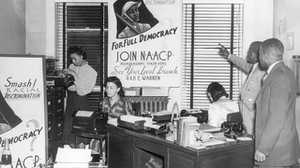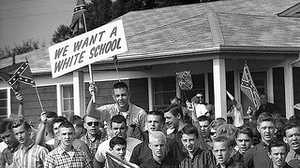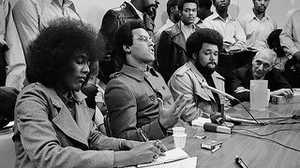Civil Rights Today

Alan Jenkins is the executive director and co-founder of The Opportunity Agenda, an organization that works to expand opportunity in America through research, communications, and advocacy. His career has taken him to the Ford Foundation as Director of Human Rights; to the U.S. Department of Justice as Assistant to the Solicitor General; and to the NAACP Legal Defense and Educational Fund as Associate Counsel. In his current role he works with a range of social justice groups to expand opportunity in America.
by Alan Jenkins
What is the state of civil and human rights today? We've made a huge amount of progress but we still have a long way to go. There's very little of the kind of formal bigotry and segregation that we saw in Eyes on the Prize, but there's still a lot of discrimination in our society, unfortunately.
Addressing Inequities Today
The modern civil rights movement is working to address the less visible but very important inequities in our society. Opportunity in America should mean everyone has a fair chance to achieve his or her full potential. Our country hasn't yet fulfilled that promise.
Hurricane Katrina provides a good example. What it revealed is that there's still significant racial inequality and desperate poverty in America. A lot of that springs from discrimination from long ago that concentrated black people in the poorest neighborhoods — the neighborhoods that were most vulnerable to flooding, that are farthest from good jobs, schools and hospitals, and the hardest to get out of with transportation in an emergency. So those were the people who were hardest hit when Katrina struck. African American communities were not thought of by our government in the same way as more affluent or white communities.
The modern civil rights movement focuses on expanding opportunity so that kind of thing doesn't happen again. It's important to determine what's different now compared to the Eyes era. We've got to eradicate the more subtle manifestations of racial bias in our society that go back to those earlier times.
The Movement's Impact
The African American civil rights movement has inspired a lot of other groups that have suffered injustices. One example that we saw recently was the immigrant rights demonstrations around the country. Immigrants' assertion that "we too are America" was inspiring, and very much in the spirit of the civil rights movement. In addition, there's been, since the late Sixties, a powerful Latino civil rights movement, that included the farm workers' movement, and includes organizations like the Mexican American Legal Defense Fund, patterned on the NAACP's Legal Defense Fund. The women's rights movement was inspired in part by the African American civil rights movement. Certainly the immigrant rights movement, and the gay rights movement as well. Those are just a few examples. Dynamic people in those communities have led the movements, but the African American civil rights movement provides a powerful template for activism.
The impact of the civil rights movement has spread throughout the world. I've met with people in India — Dalits, who are the former "untouchable" caste. What's exciting is that Martin Luther Kinglearned nonviolent strategies from Indian leader Mahatma Gandhi, so it's kind of a full circle. When I traveled to India I met activists who were singing "We Shall Overcome" — the touchstone song of the American civil rights movement — in Hindi, and talked about how they had gotten inspiration from the American civil rights movement for their own struggle to achieve rights in Indian society. And there are many more examples worldwide.
Improving Our Own Communities
The first thing that people can do to improve things around them is to make sure that we live up to the promise of opportunity in our own lives. That means treating each other fairly and trying to examine our own biases. We all carry around biases and stereotypes in our heads, and that's a part of being human. But we all have an opportunity to step outside of them and make sure we're treating people the way we want to be treated.
The second thing is to be part of making our society more equal. That could mean calling up your local TV station and either complementing reporting they're doing, or asking them why they aren't doing more to expose inequality and highlight solutions. Write letters to the editor — including writing to your school newspaper — about how issues of opportunity are playing out in your community and what you can do about it.
The Implicit Association Test on race is an online test that you can take on Harvard University's Web site. It's a fascinating way to see biases you might unknowingly have. The test flashes up images of people from a variety of racial groups, and pairs them with negative and positive words. It's designed to demonstrate that everyone carries around implicit biases to some degree. It's a very interesting test. Of course, there is a difference between the Bull Connors — the hateful racists — and the rest of us, who are people of good will, but we don't always recognize the stereotypes we carry around with us.
What does implicit or subconscious bias mean for police officers who have a split second to make a decision? What does it mean for school admissions officers or others making a decision that affects someone's direction in life? The question for people to ask themselves is, if this person looked different, would I make the same decision?
Civil Rights Today
I think we're at a crossroads now for opportunity. There are some areas where we've made great progress. For example, African American women have made the most progress of any group in college attendance — a remarkable success story. But in many other areas America is in real trouble. Great inequality and discrimination still exist in our school systems, our criminal justice system, and other aspects of our lives. Research shows, for example, the need to address the employment and housing discrimination that still exist. Nearly one out of every four African Americans seeking housing experience discrimination. That's happening today. And yet there's very little written about it — people are really unaware that that's the case. We find similar levels of discrimination in employment statistics.
People interested in finding out more can read a report on our web site called The State of Opportunity in America. It explores how we're doing as a nation in achieving opportunity for all, in terms of equality, economic security, and more.
It's a very important time now for America to reinvest in that struggle for overcoming inequality and discrimination. They are really contrary to our values as a country.
Source: Jenkins, Alan. Interview by Maria Daniels, WGBH Boston, July 2006.







